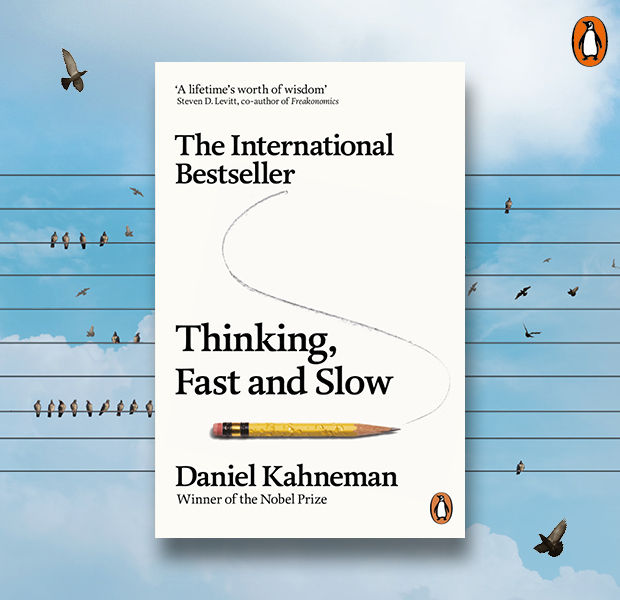Read an excerpt from Thinking, Fast and Slow – the acclaimed bestseller that will change the way you make decisions
More about the book!

In the New York Times bestseller Thinking, Fast and Slow, Daniel Kahneman, world-famous psychologist and winner of the Nobel Prize in Economics, takes you on a groundbreaking tour of the mind and explains the two systems that drive the way we think.
Thinking, Fast and Slow offers a whole new look at the way our minds work.
Why is there more chance we’ll believe something if it’s in a bold type face?
Why are judges more likely to deny parole before lunch?
Why do we assume a good-looking person will be more competent?
The answer lies in the two ways we make choices: fast, intuitive thinking, and slow, rational thinking.
Kahneman exposes the extraordinary capabilities – and also the faults and biases – of fast thinking, and reveals the pervasive influence of intuitive impressions on our thoughts and behaviour.
Thinking, Fast and Slow reveals how our minds are tripped up by error and prejudice (even when we think we are being logical), and gives you practical techniques for slower, smarter thinking. It will enable to you make better decisions at work, at home, and in everything you do.
Read an excerpt:
~~~
Introduction
Every author, I suppose, has in mind a setting in which readers of his or her work could benefit from having read it. Mine is the proverbial office water-cooler, where opinions are shared and gossip is exchanged. I hope to enrich the vocabulary that people use when they talk about the judgments and choices of others, the company’s new policies, or a colleague’s investment decisions. Why be concerned with gossip? Because it is much easier, as well as far more enjoyable, to identify and label the mistakes of others than to recognize our own. Questioning what we believe and want is difficult at the best of times, and especially difficult when we most need to do it, but we can benefit from the informed opinions of others. Many of us spontaneously anticipate how friends and colleagues will evaluate our choices; the quality and content of these anticipated judgments therefore matters. The expectation of intelligent gossip is a powerful motive for serious self-criticism, more powerful than New Year resolutions to improve one’s decision making at work and at home.
To be a good diagnostician, a physician needs to acquire a large set of labels for diseases, each of which binds an idea of the illness and its symptoms, possible antecedents and causes, possible developments and consequences, and possible interventions to cure or mitigate the illness. Learning medicine consists in part of learning the language of medicine. A deeper understanding of judgments and choices also requires a richer vocabulary than is available in everyday language. The hope for informed gossip is that there are distinctive patterns in the errors people make. Systematic errors are known as biases: they recur predictably in particular circumstances. When the handsome and confident speaker bounds to the stage, for example, you can anticipate that the audience will judge his comments more favorably than he deserves. The availability of a diagnostic label for this bias—the halo effect—makes it easier to anticipate, recognize, and understand.
When you are asked what you are thinking about, you can normally answer. You believe you know what goes on in your mind, which often consists of one conscious thought leading in an orderly way to another. But that is not the only way the mind works, or indeed is that the typical way. Most impressions and thoughts arise in your conscious experience without your knowing how they got there. You cannot trace how you came to the belief that there is a lamp on the desk in front of you, or how you detected a hint of irritation in your spouse’s voice on the telephone, or how you managed to avoid a threat on the road before you became consciously aware of it. The mental work that produces impressions, intuitions, and many decisions goes on in silence in our mind.
Much of the discussion of this book is about biases of intuition. However, the focus on error does not denigrate human intelligence, any more than the attention to diseases in medical texts denies good health. Most of us are healthy most of the time, and most of our judgments and actions are appropriate most of the time. As we navigate our lives, we normally allow ourselves to be guided by impressions and feelings, and the confidence we have in our intuitive beliefs and preferences is usually justified. But not always. We are often confident when we are wrong, and an objective observer is more likely to detect our errors than we are.
So this is my aim for water-cooler conversations: improve the ability to identify and understand errors of judgment and choice, in others and eventually in ourselves, by providing a richer and more precise language to discuss them. In at least some cases, an accurate diagnosis may suggest an intervention to limit the damage that bad judgments and choices often cause.
~~~
Categories International Non-fiction
Tags Book excerpts Book extracts Daniel Kahneman Penguin Random House SA Thinking Fast and Slow
